The 12 Best & Worst Almond Butters, According to Dietitians
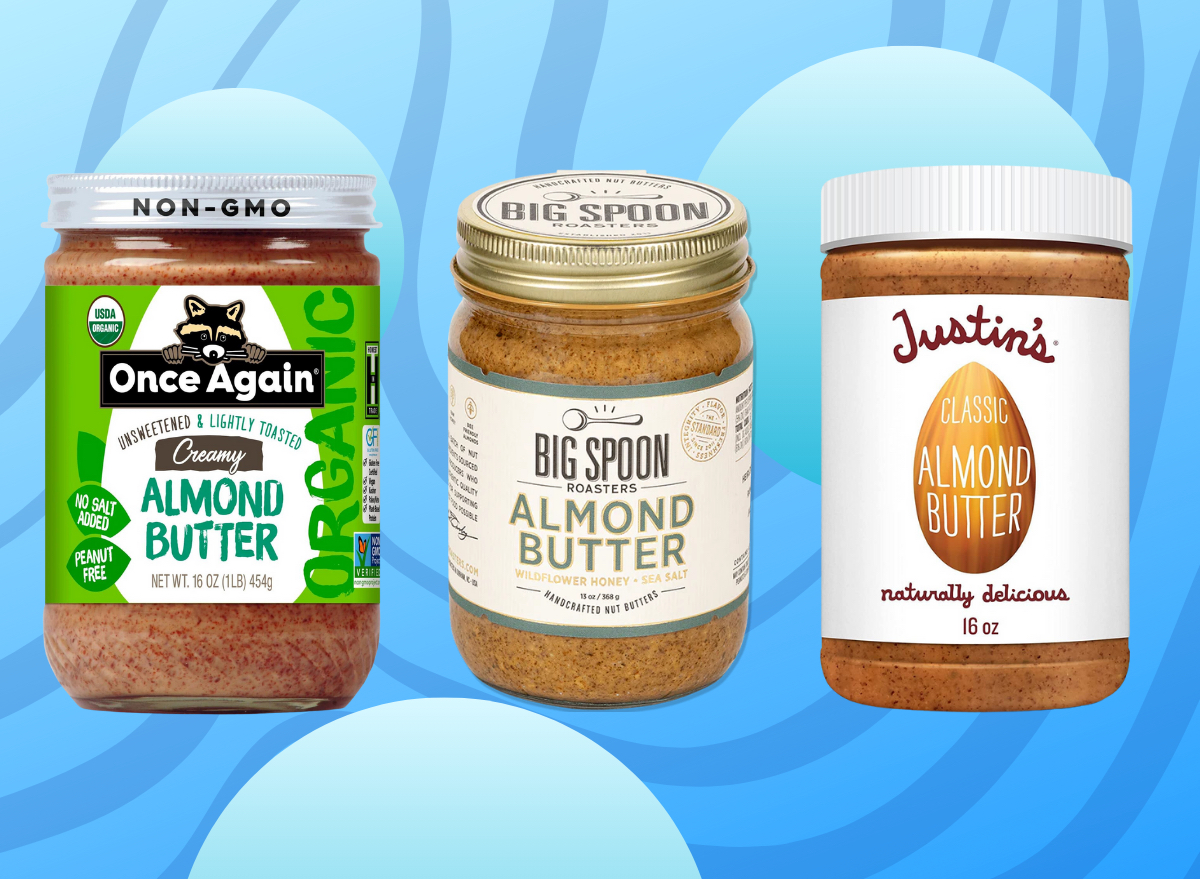
With the rise of allergy-friendly nut butters, almond butter has become a staple in many American households. It’s a great alternative to peanut butter in everything from sandwiches to smoothies to snacks. Nutritionally, it’s very similar to peanut butter and other nut butters, but it is also a good source of fiber, protein, and vitamin E.
The last time you took a stroll through the almond butter section of your supermarket, you likely noticed that there are dozens of varieties of this nutty staple to choose from, and some of them are healthier than others.
Almond butter sounds like it’s always a healthy food, but this nut butter can be easily packed with sugar, sodium, and added ingredients that may make it less nutritious for you. That’s why we spoke with dietitians and nutrition experts to find out exactly what the best almond butters are that they like to recommend and why. We are also bringing you three almond butter’s that may not be the best choice, especially if you are eating them regularly.
What makes the healthiest almond butter:
- Calories: All almond butters are roughly the same calories, but some are higher than others particularly if they have added fat or sugar. Although, some on our list of the best almond butters have added nutrients that increase the bang for your buck even if it means consuming more calories per serving.
- Sodium content: Many almond butters are sold either salted or unsalted. Looking for unsalted the majority of the time can help reduce sodium intake in your diet which can be impactful for your blood pressure and heart health.
- Added sugar and oils: Almond butter can separate in the jar if it is not made with added oils. You may also find that some brands incorporate added sugar to sweeten the flavor profile. Look for almond butter with minimally added oil and sugar for the healthiest option.
Including less healthy almond butters in your diet some of the time is not a big deal when it comes to your health. However, if you often consume almond butter brands that are high in sugar and added fat, you might want to consider swapping those out for a healthier alternative.
Take a look at our expert recommendations to learn which almond butters are the best and worst on grocery shelves today. Read on, and for more, don’t miss 17 Healthiest Peanut Butters To Buy, Say Dietitians.
The 9 Best Almond Butters
Best: Big Spoon Roasters
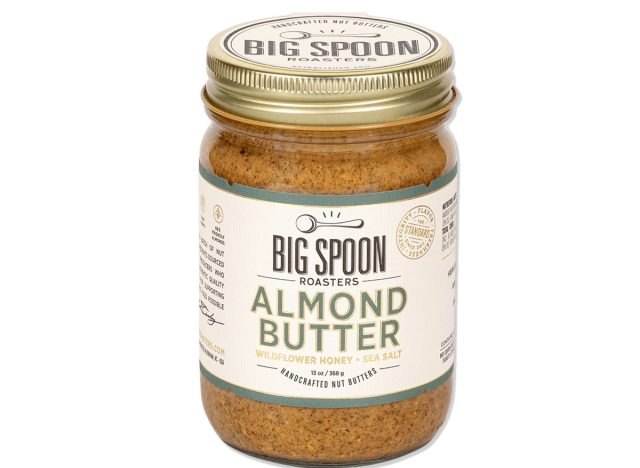
With just 1 g of sugar, this brand of almond butter is great for folks who are watching their blood sugar or at least do not want to consume any added sugar. I am slightly obsessed with anything Big Spoon Roasters makes, and their almond butters don’t disappoint, says Lauren Manaker, MS RDN LD CLEC. “Their almond butter with wildflower honey is just sweet enough and made with quality ingredients. This nut butter leans on mission almonds, which offer a rich flavor,” she explains.
Best: Justin’s Classic Almond Butter
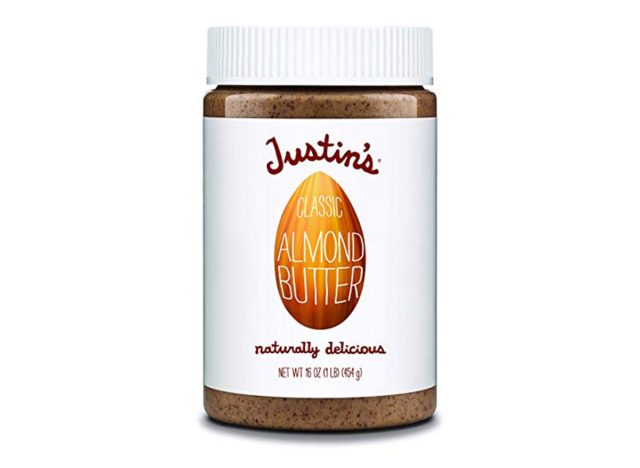
Sold in a couple different flavors including honey almond butter and cinnamon almond butter, we love that Justin’s focuses on simple ingredients.
“My absolutely favorite almond butter to recommend is Justin’s Classic Almond Butter,” says Erin Palinski-Wade, RD, CDCES author of Belly Fat Diet for Dummies & 2 Day Diabetes Diet and a partner with Justin’s. “With just two simple ingredients, this is a nutrient-packed almond butter you can feel good about. Just one serving provides 6 grams of protein and makes the option for sandwich, fruit & veggie dips, or just snacking on it alone,” she adds.
Best: Artisana Organics Raw Almond Butter
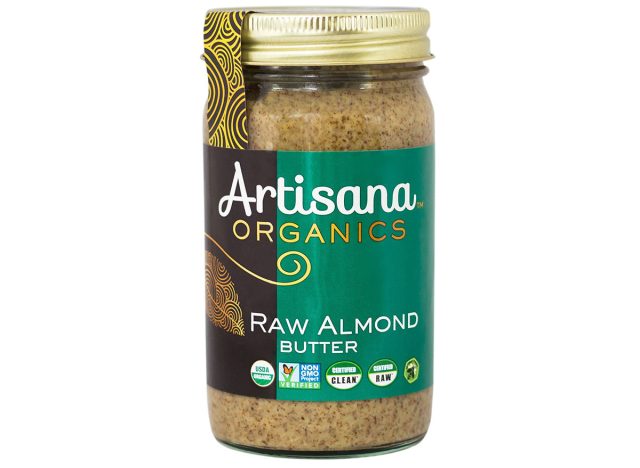
With less saturated fat than most, we love the heart-healthy benefits of this almond butter. Bonnie Newlin, MS, RD, LDN, CLT, owner of Crave Nourishment Nutrition shares her recommendation with us: “My favorite almond butter is Artisana Organics Raw Almond Butter which is free of palm oil, added sugar, and sodium. It scores high in the flavor department while providing bioavailable nutrients.”
Best: Kirkland Signature Creamy Almond Butter
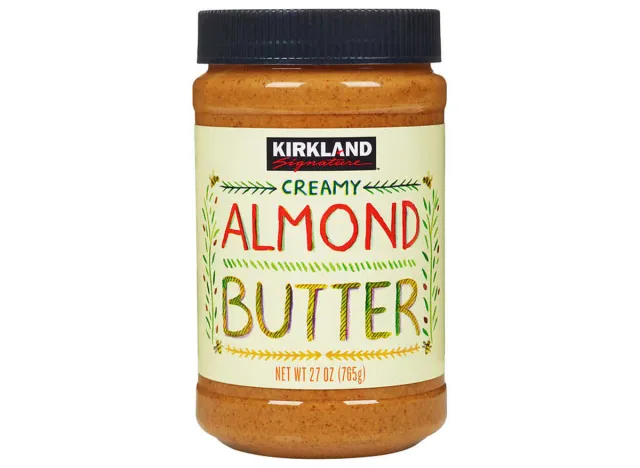
Ashley Kitchens, MPH, RDN, plant-based dietitian and owner Plant Centered Nutrition gives us her expert recommendation: “Kirkland Signature Creamy Almond Butter is a convenient, affordable option that provides many health benefits: it contains no added sugar or salt and is free from artificial preservatives, flavors, and colors. Plus, it’s vegan-friendly and a good source of protein, iron, calcium, vitamin E and fiber. It’s one of the most affordable almond butters on the market, coming in at $8 for 27 ounces. You get all the nutritional benefits without breaking the bank.”
Best: Once Again Almond Butter
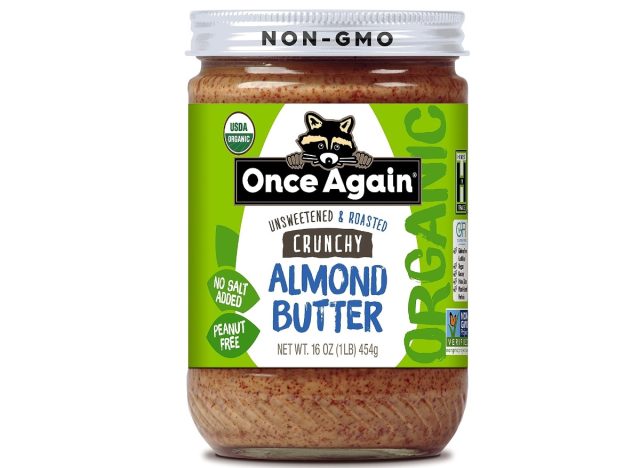
Once Again offers a healthy almond butter product that has no added sodium, no added sugar, and simple ingredients. We think this almond butter would pair perfectly with some graham crackers, an apple, or drizzled on top of a yogurt bowl for a snack.
Best: Georgia Grinders
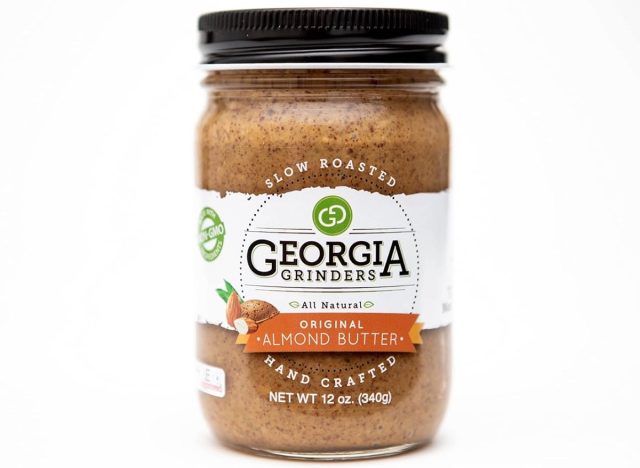
Lightly sweetened with just 2 g of sugar, we love the looks of this brand. With 190 calories, 3 g of fiber, and 7 g of protein, you’ll be sure to feel full in satisfied from this hearty nut butter.
“I discovered Georgia Grinders at a farmers market and love their almond butter because it’s literally just almonds and sea salt! and Plus it’s crunchy and delicious, and created by an amazing family-owned brand,” says Caroline Young, MS, RD, LD, RYT Owner of Whole Self Nutrition.
Best: 365 Organic Creamy Unsalted Unsweetened Almond Butter
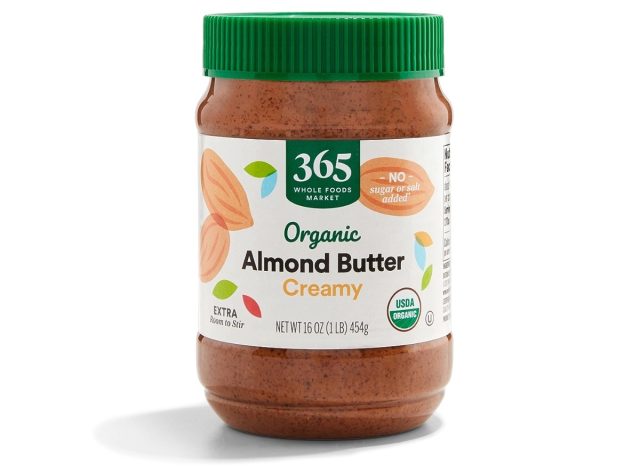
“If you’re looking for heart-healthy almond butter, this product is the perfect option. This one-ingredient creation has an ideal blend of not only heart-protective fats but also contains no cholesterol or sodium,” shares Joanna Ayalloore, MS, RD, and owner of Nutrition Kept Simple.
Whole Foods has done it again with an impressive ingredient list that contains just almonds. We love their emphasis on an almond butter product that has no sugar or salt added.
Best: Trader Joe’s Almond Butter
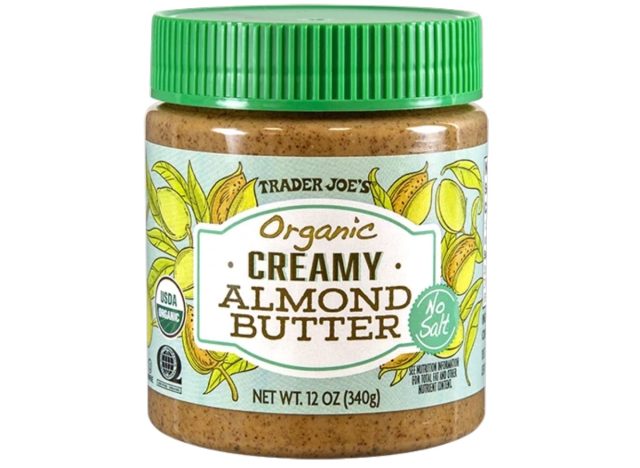
“I love Trader Joe’s Organic Almond Butter because it has a smooth and creamy texture that makes it easy to spread on toast or use in recipes,” explains Wan Na Chun, MPH, RD, CPT of One Pot Wellness. “It’s made with only roasted almonds and salt, and it does not contain any added sugars or preservatives, making it a healthier option than other almond butters. One of the best parts is that Trader Joe’s almond butter is reasonably priced and is a great value for the quality of the product,” Chun comments.
Trader Joe’s has a variety of almond butters to choose from, and this is one of the best at the store. We love that they do not add any extra salt and include just 2 grams of added sugar in the product.
Best: RXBAR Maple Almond Butter
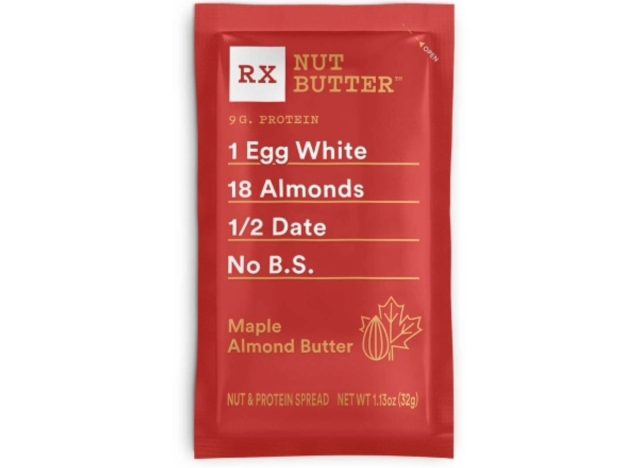
RXBAR branched into the almond butter game, and we are so grateful they did. They changed the game by including egg whites into their formula which increases the protein per serving and helps us feel more full and satisfied after snacking.
With 9 grams of protein per serving, you would be hard-pressed to find a higher protein almond butter on the market.
The 3 Worst Almond Butters
Worst: MaraNatha Caramel Almond Butter
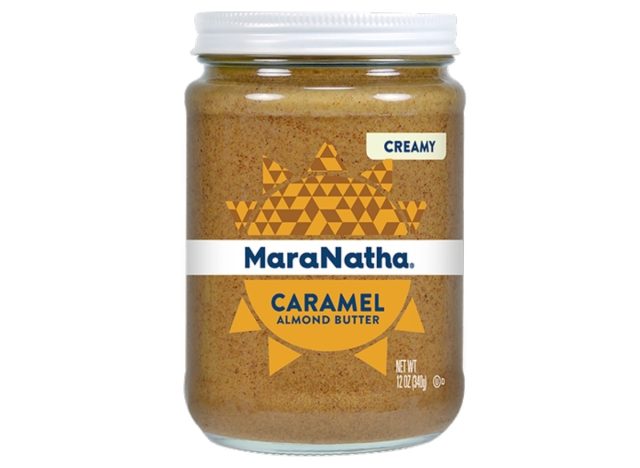
While we love some of MaraNatha’s other almond butter flavors, this one is not our favorite. With 11 grams of sugar per 2-tablespoon serving, it’s no surprise that the caramel flavor is likely not the healthiest option. Instead, we might recommend their classic unsalted, no-sugar-added flavor instead.
Worst: Good&Gather Dark Chocolate Almond Butter
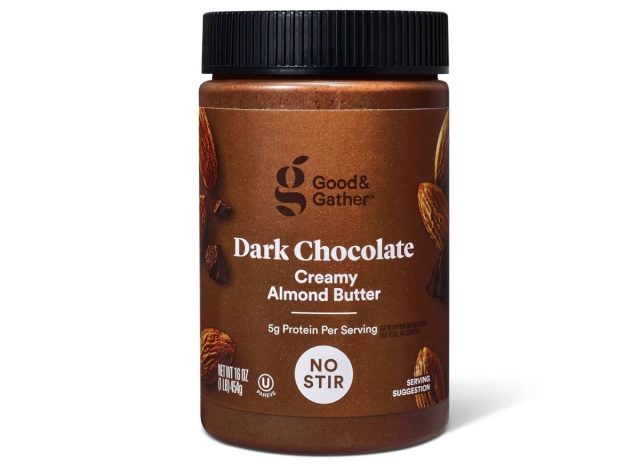
While choosing a flavored almond butter like this one from time to time will not have a major effect on your health, if you are choosing them often, the added sodium and sugar can add up. These kinds of flavors are often easy to overeat and can result in consuming more than a recommended portion size.
Worst: Trader Joe’s Cocoa Almond Spread
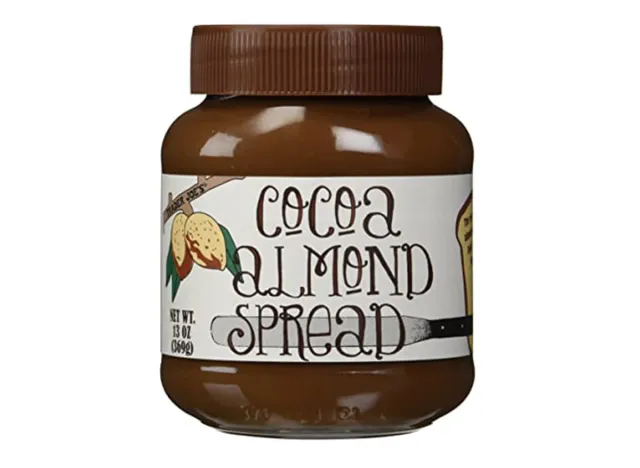
By far the worst almond butter we could find on the market is Trader Joe’s almond spread which is a spinoff of hazelnut spreads like Nutella. With 19 grams of added sugar, you are nearly meeting your added sugar goal for the day according to the dietary guidelines. This product has less fiber and less protein than most almond butters on the market and is not our first choice for a healthy snack.









